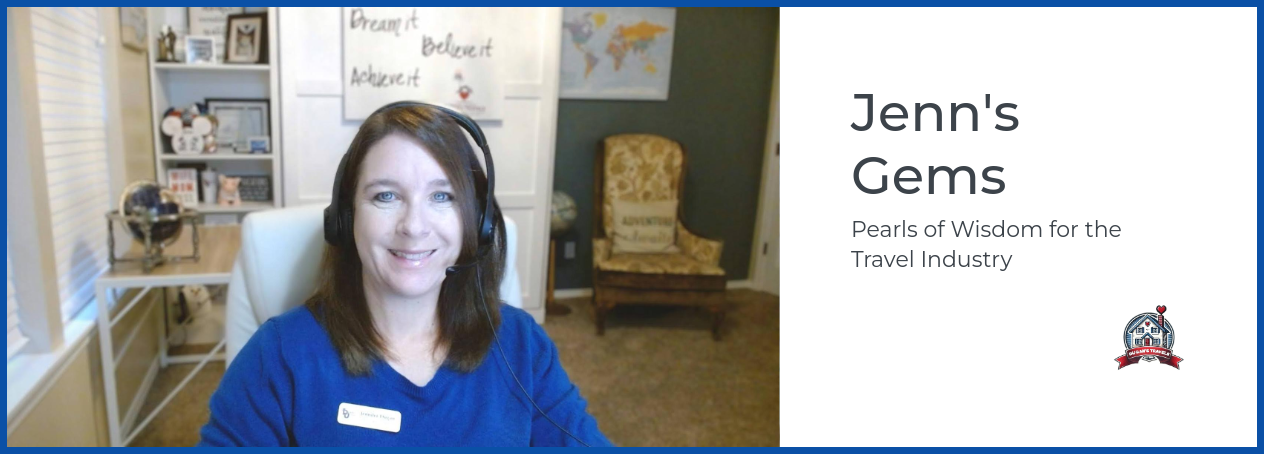Hello! Welcome to another edition of the Travel Hi-Five where you can usually tell what has been on my mind most recently. Better said, many things that are on my mind is because they are on yours. I might have seen you at a recent industry event or we have talked on the phone. Those conversations tend to have concurrent themes. This month’s theme as you guessed by the title is imposter syndrome.
This “affliction” is not unique to the travel business; it rings true for anyone who cares about their business and the potential influence you have on your customers' vacation dollar spending. What is unique to travel though is not realizing that you already know what to do, so therefore there is no way you’re an imposter. Hear me out. Running your own business is exciting, empowering — and sometimes, incredibly intimidating. One of the most common but least talked about challenges faced by both new AND seasoned travel advisors is imposter syndrome. That nagging voice in your head that whispers, “I’m not good enough,” “I’m just lucky,” or “People will find out I have no idea what I’m doing.”
Imposter syndrome is defined as the persistent inability to believe that one's success is deserved or has been legitimately achieved. According to a review in the Journal of General Internal Medicine, it affects up to 82% of people at some point in their careers, regardless of their level of success (Bravata et al., 2020). For business owners in the travel industry — a space filled with constant change, complex logistics and a flood of social media highlight reels — it’s easy to feel like you don’t measure up. Can we just acknowledge that it afflicts enough people that a medical journal did a review of it?
But here’s the truth: your experience — whether personal, professional or a mix of both — makes you credible. Below are five key points that can help you recognize, manage and overcome imposter syndrome as a travel business owner.
1. Imposter Syndrome Looks Different at Every Stage
For new travel advisors, imposter syndrome often shows up as hesitation to sell, doubt in decision-making or reluctance to charge for your services. You might compare yourself to industry veterans, thinking, “Who am I to offer travel advice when I just started?” This is the common refrain I hear from new advisors.
For experienced advisors, the symptoms are sneakier. You might have years of successful bookings and happy clients, but still feel like you're "faking it" because you haven’t reached a certain income level or social media following. Some even feel fraudulent when pivoting to a new niche, despite having transferable skills.
Understanding how imposter syndrome manifests at different stages can help you see it for what it is: a mindset challenge, not a reflection of your actual ability.
2. Experience Is More Than Years in the Business
A common myth in the travel industry is that credibility only comes from a long client list or decades of booking experience. But in reality, your personal travel experiences are a valuable foundation. Maybe you’ve spent years planning family trips, traveling solo or organizing group getaways for friends. That lived experience builds intuition, cultural awareness and logistical problem-solving — skills that clients desperately need. They are often the thing that brought you to seek a role in this industry.
For instance, if you’ve backpacked through Southeast Asia or planned multigenerational cruises, you already bring something powerful to the table that a textbook can’t teach. I find that people tend to forget that they did this for friends and family before and are often seen as the expert in their close knit circles. Why should that change now that it is your business?
3. Clients Value Trust Over Perfection
When clients book travel through you, they’re not expecting perfection — they’re looking for trust, clarity and support. According to a 2023 report from the American Society of Travel Advisors (ASTA), travelers prioritize trustworthiness and personal recommendations over credentials or years in the business. That is worth reading one more time. Let those words sink in.
This is great news for advisors at every level. You don’t need to know everything; you just need to be willing to find the answer and advocate for your clients. Showing up with authenticity and care builds far more credibility than pretending to be flawless.
4. Comparing Your Journey Is a Losing Game
Social media has intensified the comparison trap. Seeing others post about luxury FAM trips or massive sales months can make your progress feel small. But remember: online success is often a curated snapshot, not the whole story.
Instead of comparing yourself to others, focus on tracking your own growth. Celebrate every win — your first booking, your first client testimonial, your first group trip. Each step forward is proof of your capability, and over time, that builds true confidence. Make a game of it and create a Personal Bests board of five areas you want to compete with yourself on. You are only allowed to erase it and put a new number on that board when you have beat that number. My personal favorites: My Highest Commission Earned EVER and My Largest Booking EVER in $. Try this technique; you will be amazed how motivating it is.
5. You Already Have What You Need
This is the most important takeaway: your unique combination of life experience, personal travel, customer service and passion is your superpower. You don’t need to wait until you’ve hit some imaginary milestone to be “credible.” So what if you never sold a widget? You have most likely been of service to someone in many aspects of your career and life.
Whether you’re helping a couple plan their honeymoon in Italy or guiding a retiree through their dream safari, your past experiences — both personal and professional — give you insights that matter. When you own that value, you’ll not only serve clients better, but you’ll start to believe in yourself, too.
Final Thoughts
It is not a bad thing to feel like an imposter at times. In fact it is very normal. Imposter syndrome doesn’t disappear overnight. But recognizing it, reframing your thoughts and leaning into your existing strengths is the first step in conquering it. As a travel business owner, you are credible from the get go. Your experiences, your dedication and your willingness to learn all serve as proof.
So the next time you doubt your place in this industry, remember: you’re not an imposter — you’re an expert in progress. Here is to your future success!






Paula | 06/25/25 - 02:36 PM
These are some great points. Its nice to know others feel this way too. I've been in the business since 1996. I'm pretty well versed in most destinations, but a total novice in others. You have to remember that they are coming to you because you have the information they need or they know that you can find what they need. Thanks for the words of encouragement!
1 | reply ⋯